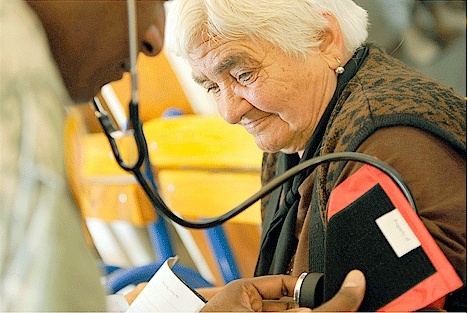By Jessica Switzer
Special to the News-Times
MIHAIL KOGALNICEANU AIR BASE, Romania— Nearly 40 years ago, murals depicting the glory of the Soviet military were freshly painted at the Novo Selo training area in Bulgaria. Today, 20 years after the end of the Cold War they are flaking, subdued images of a bygone era. Now, artificial thunder echoes through the hills as a Bulgarian M1117 Guardian armored security vehicle runs the training course, mowing down targets with fire from its mounted heavy machine gun.
The son of an Oak Harbor couple is faced with these reminders of the Cold War and the difficulties of conducting U.S. Army business in a foreign nation, as a member of Joint Task Force-East, a multi-national task force designed to make stronger allies of Romania and Bulgaria.
The operation hones the skills of soldiers from all three nations as well as helping the people living in some of the poorest areas of the two European countries.
Army Lt. Col Daniel E. Herrigstad, son of Harvey and Rose Herrigstad, of Oak Harbor, is a public affairs officer with the U.S. Army Europe Office of the Chief of Public Affairs in Heidelberg, Germany, and is currently deployed to Romania to support the task force, based at Mihail Kogalniceanu Air Base, Romania.
“I am the planner and officer in charge of all public affairs operations, including media and community relations and internal information, in support of Joint Task Force-East operations in Romania and Bulgaria,” said the 1982 Oak Harbor High School graduate. Herrigstad went on to earn a Bachelor of Arts degree in Business Administration in 1987 from Washington State University in Pullman. “I facilitate telling local, regional and international audiences what it is we are doing here and why we are doing it.”
Soldiers from all three countries trained together in individual and company-level movements as well as with armored vehicles, a variety of weapons and combat lifesaving skills. They also practiced the coordination needed to go into and clear a hostile urban area. In addition to the training, the soldiers took time to visit a number of local villages and allowed children to explore the vehicles they were using.
“Working abroad like this is something I wish everyone got the opportunity to do,” said Herrigstad. “One big thing most all of us have learned is that we are not much different from each other. That, to me, is a very important lesson we’ve taught each other, simply understanding what each of us is all about.”
Military training wasn’t the only reason American service members were in Romania and Bulgaria. A group of doctors and nurses traveled to several villages around the training bases in both countries. The team worked with local health care workers and translators to provide screenings for optical and other general health concerns. There was also a team of Navy Seabees helping renovate and upgrade local schools and medical facilities.
In spite of the language barrier and cultural differences the American Soldiers and their Bulgarian or Romanian counterparts were usually able to get their messages across.
“My experience working with our Romanian and Bulgarian partners has been fantastic,” said Herrigstad, who was in the active duty Army for seven and a half years following his commissioning in 1987. He then transferred to the Army Reserve in 1995. He was activated in 2005 and is currently on a two-year tour with U.S. Army Europe in Heidelberg, Germany.
“The language barrier is sometimes a challenge but we always work through that. I have good friends here now, friendships that will certainly last way beyond this exercise. That’s what this mission is about, building relationships.”
Whether building new schools, bringing medical services to villages or practicing the art of war, Romanian, Bulgarian and American service members, like Herrigstad, are working to keep the positive relationships going long after everyone has gone home. The relationships built on this training ground will go a long way toward making sure the three nations can work together seamlessly.
Jessica Switzer is an Air Force Staff Sergeant


